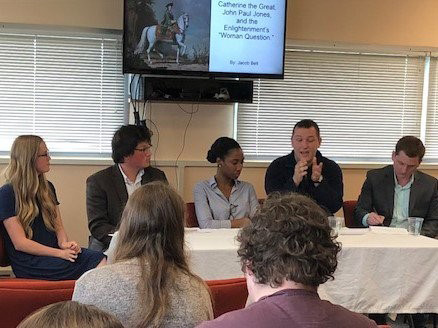
Jacob Bell, and Jeremy Howell discuss their Honors theses.
At the symposium, honors thesis writers divided into three panels: Twentieth-Century World, Religious History, and Early Modern Empires. Each panelist gave a short presentation on their thesis, and attendees asked questions and offered feedback. Symposium participant Jeremy Howell appreciated the strong turnout and the thoughtful questions he received. “I think the energy is great,” Howell said. “I’m not sure that would be the case at every school, that undergraduate research would be taken seriously. As a student doing undergraduate research, I always felt that what I was doing was important.”
History majors who chose to apply to the Honors thesis program are signing up for a serious commitment. During their final year at Carolina, students take a two-semester course to research, outline, and draft an historical essay of at least 50 pages (and sometimes close to 100 pages). Although all Carolina history majors write papers based on original research, few students have undertaken projects of this magnitude prior to embarking on their thesis project. Thus, both a faculty adviser and the instructor of the honors thesis course – this year, Kathleen DuVal – work with the students as they encounter new research and writing challenges. The process culminates when students defend their final projects in front of a committee of faculty members who grill them for an hour or more.
This year’s Honors students came to their topics in a variety of ways. Jeremy Howell, who wrote his thesis on the evolution of the legend of Prester John, a mythical Christian king in Ethiopia, wanted an opportunity to learn more about African history. Michael Purello was inspired to write his thesis while studying abroad in Spain. “The available English novels were all set during the Spanish Civil War,” Purello explained. “I was reading books and also learning about it in the history classes I was taking at university there, because it’s obviously mentioned very regularly. Then I came back and continued my research.”
Some students had to do original research outside of Wilson Library for the first time. Many received travel awards from the Department of History or Honors Carolina to support their work. With the funding she received, Frances Cayton did research at the Hoover Institution at Stanford University, the Polish Institute of Arts and Sciences of America in New York, and the Rare Book and Manuscript Library at Columbia University.
Yet for other honors thesis writers, Wilson Library offered an ideal primary source base. Emma Watts, who sees local history as an important but “overlooked” field, wanted to focus her project on UNC’s campus. Watt’s thesis, titled “‘The Wimmin Are With Us To Stay’: Women’s Social Activities at the University of North Carolina at Chapel Hill from 1897 to 1946,” shows how women students at Carolina used extracurricular activities to make themselves “a more integral part of the culture of UNC.”
A number of the Honors thesis writers are considering graduate school in history. For them, this project provided an introduction to the sorts of questions and challenges they will encounter if they continue to pursue advanced historical research. For example, despite having access to all of the collections in Wilson Library, Watts struggled to find primary sources that included women students’ voices. “I definitely had to work outside the box because there weren’t enough of women’s actual perspectives who lived through it to build my whole paper, so I really just had to piece through what the Dean of Women was saying, what the DTH was publishing,” Watts said. “I had to fit together what the story would be, since I couldn’t get it firsthand.” Any professional historian knows the feeling—and the satisfaction that comes with finding an imaginative way to revise the project and move forward.
– Aubrey Lauersdorf
